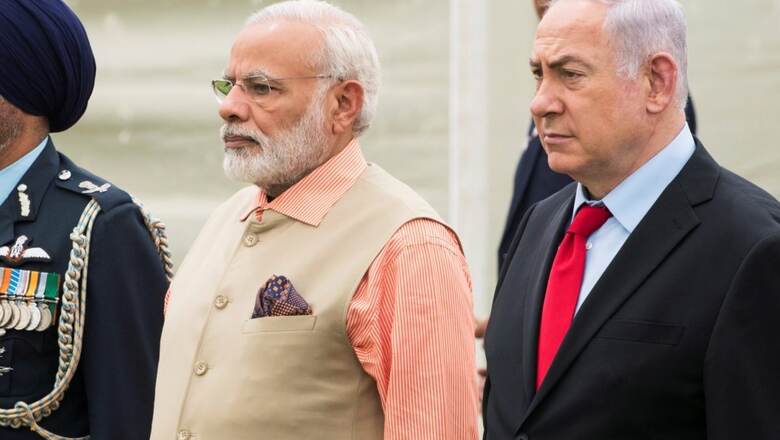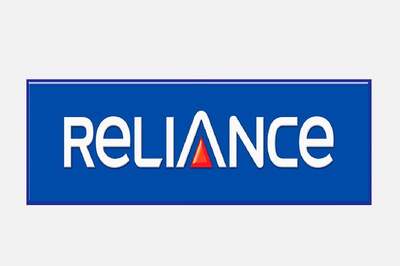
views
In the last decade, one of the greatest success stories for Prime Minister Narendra Modi’s foreign policy has come from the West Asian region. Thanks to his personal investment in terms of high-level visits and regular engagement with leaders such as Crown Prince and Prime Minister of Saudi Arabia Mohammed Bin Salman and UAE President Sheikh Mohamed bin Zayed Al Nahyan, India’s relationship with the regional countries today stands on solid ground. It is not just the Arabs who have been smitten by the grace of PM Modi but the non-Arab part of West Asia too has been heavily courted by the current dispensation.
The strongest of this relationship is the one that India has with Israel. With PM Modi’s maiden visit to the country in 2017, the first ever by an Indian prime minister, Israel has finally broken away from the Israel-Palestine hyphenation in the Indian scheme of things. India-Israel relations are now being driven by strategic convergences between both countries instead of the old days of balancing by India, where it took serious care in not sending any wrong signal regarding the Palestinian cause to the greater Arab world. What had also enabled India’s changed behaviour towards Israel was the Arab world’s own stand on the issue.
A wind of change had been blowing for the past few years in the Arab world with a behind-the-scenes rapprochement going on between Israel and Arab states. Though in private, these countries maintained engagement with Israel but in public, they were very cautious because of the sensitivities regarding the Israel-Palestine conflict. Nevertheless, the process led to many concrete outcomes, of which, the Abraham Accords is also one. As a part of this agreement, which was brokered by the United States, two key Arab states — UAE and Bahrain — had agreed to normalise their relations with Israel after recognising its sovereignty and establishing diplomatic relations with the country. There were hopes that these accords would be expanded to include Saudi Arabia as well. This was definitely a pet project of the Biden administration that in the last few months had actively pushed for a normalisation between the Saudis and Israelis.
The normalisation process between the Arab world and Israel was like a dream come true for India. As India’s own economy leapfrogged and its relationship with the United States also deepened, India was all set to drive a lot of mileage from US-backed initiatives in the region. Primarily, this included the I2U2 grouping which some even refer to as the West Asian Quad, and the IMEC initiative which was recently launched in September only. The I2U2 grouping was set up in 2021 with participation from India, Israel, UAE and the United States and aimed at cooperation in multiple sectors such as space, energy and food security. The interesting development regarding I2U2 was the idea of an Indo-Abrahamic alliance proposed by Mohammed Solimon, a foreign policy expert at the Washington DC-based Middle East Institute. It proposed to expand the grouping to countries such as Saudi Arabia and Egypt as well. Such an expansion would have been favourable for India as it would have given it direct access to shape outcomes in the region.
Similarly, the IMEC initiative which was launched at the G20 summit in New Delhi also had the potential to be a game-changer. This mega connectivity project involved multimodal linkages between India, the Middle East and Europe which was aimed at challenging China’s global hegemony scheme, the Belt and Road Initiative. At a time when India is focusing on building its manufacturing strength, this initiative was supposed to give India’s entry into global supply chains a jump-start.
However, last week’s attack by Hamas on Israel has scuttled away a lot of such gains that India had made in the last decade. A realistic assessment of the region’s geopolitics informs us that any progress on such initiatives that require Israel-Arab rapprochement would be very difficult, if not possible, in the time to come. The reason is the intraregional rivalry and the return of the Israel-Palestine conflict’s centrality to it.
In the last few years, Arab states have gravitated towards Israel due to their own selfish interests. The perceived withdrawal of the United States from the region due to its focus on the security architecture of the Indo-Pacific had fuelled a reassessment in regional Arab countries towards the post-US Middle East. Interestingly, they found a strange comfort in Israel whose military prowess started appealing to them as a strong counter to nuclear-abled Iran. This chemistry was on full display when Israeli surveillance technology came to the aid of regional leaders during the season of Arab spring. What’s most notable is the Palestine question had started becoming irrelevant to the overall ties between Arabs and Israel. There was a status quo in the form of an accommodative stage reached between the peaceful Palestine Liberal Authority and Israel. But who knew that the Palestine question would soon come to haunt due to the worst kind of terror attack against a country in recent times?
What Hamas’ attack on Israel has done last week is that it has once again brought the Palestinian question to the fore. However, this time, the violent revival of Palestine cause has come from the non-Arab part of the region, the main benefactors of the Hamas grouping include Iran, Qatar and Turkey. According to a US State Department’s Report, Iran provides $100 million annually to Palestinian terror groups including Hamas. Similarly, up to 2021, Hamas had received around $1.8 billion from Qatar which was ironically declared a major non-NATO ally in 2022 by the Biden administration. Then there is Turkey which doesn’t only provide logistics and financial support to the armed Palestinian grouping but also hosts key meetings with Hamas officials.
Each of these countries is motivated by their own personal desire to portray themselves as the legitimate leader of the Islamic world. Here Palestine is the galvanising factor and support for Hamas their effective toolkit to do so. But there is more. The overall geopolitical structure of West Asia was being threatened by the rapprochement between Arabs and Israel and US-led initiatives. This was not only caging Iran with the corridor between India, the Middle East and Europe threatening its dominance in the region’s key maritime choke points but also bringing the United States in a renewed role to the region, something that Iran was increasingly wary of.
Hamas’ violent attack against Israel has now benefited Iran the most. Saudi Arabia, which was on the verge of inking a normalisation pact with Israel, is back to being very aversive to any such move. Not only did its statement on the attack indicted Israel but it has also emerged as the staunchest critique of the country since Israel launched its revenge offensive. As per sources, Saudi Arabia has also put on hold the proposal to normalise ties with Israel last week. This is a sharp U-turn from Crown Prince Mohammed Bin Salman’s statement last month that “we are inching closer to a deal of normalisation with Israel”. The changed geopolitical scenario in West Asia has become a trouble for India and a blessing for China. Any arrest in the forward movement towards I2U2 expansion or IMEC corridor is all set to help the Chinese secure its strategic interests in the region. In such a situation, India’s approach can only be to wait and watch.
The author is a PhD from the Department of International Relations, South Asian University. She writes on India’s foreign policy. Views expressed in the above piece are personal and solely that of the author. They do not necessarily reflect News18’s views.




















Comments
0 comment